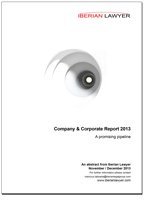Market investigations on the rise – Ramón y Cajal Abogados
Since the Competition Act 2007 was enacted, the Spanish Competition Authority has been growing in stature. And its recent merger with several regulatory authorities, into the National Commission for Markets and Competition, might give it even more power, according to Pedro Suárez, Head of EU and Competition at Ramón y Cajal Abogados.
An interesting development is the increased activity of the Authority in the advocacy area. In particular, the Authority has been increasing its investigations into how different markets work, says Suárez. And, as they grow in significance, companies are becoming more concerned that the Authority’s reports are often produced behind closed doors, with very little direct interaction with stakeholders.
“The lack of a formal consultation with stakeholders means that the market has little input in these investigations or what the Authority recommends,” he explains. “Companies are becoming increasingly proactive in their approach to liaising with the Authority. Not doing so means missing an important chance to participate.”
Companies in sectors such as fuel and transport have complained about some of the Authority’s conclusions in recent reports into their market practices. Yet with no formal written or oral processes available, clients are turning to law firms to represent their viewpoints at an earlier stage.
“I would like to see a similar scenario to the UK Competition Authority where formal submissions are accepted from all interested parties,” Suárez says. The key difference is that, under UK law, stakeholders have the right to be heard during the investigation process and can appeal to a court to have any reports or recommendations reviewed. That is not the case in Spain.
“This is an important issue for reputation too,” Suárez concludes. “If the Authority claims a sector is uncompetitive, then the perceived implication is often that companies in that sector are also uncompetitive.”












